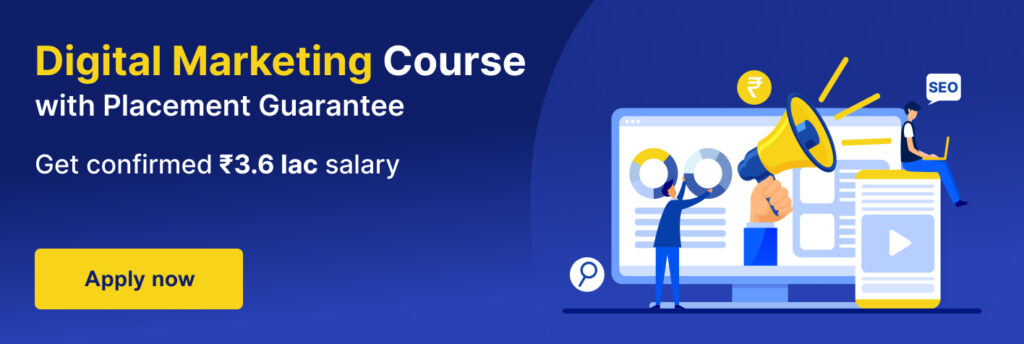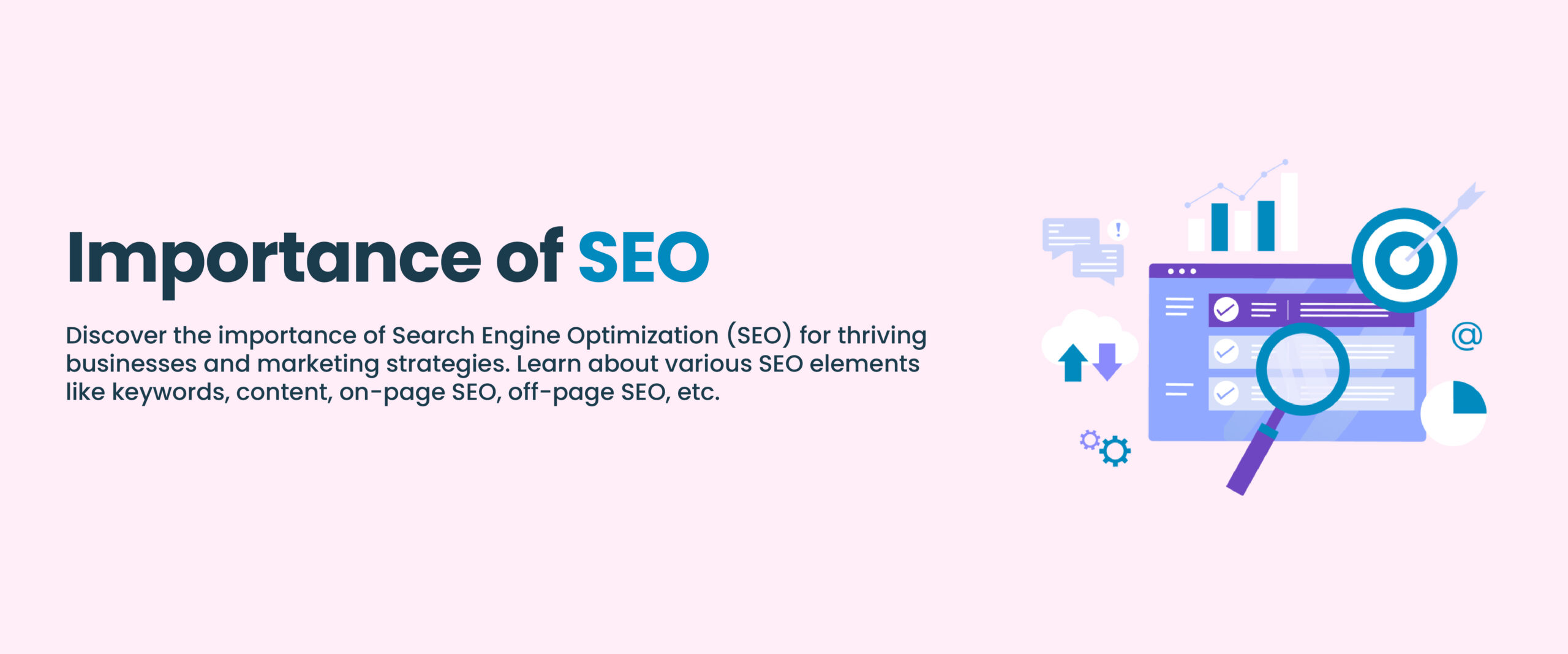What is the Importance of SEO? Elements, Techniques, & More
Search engines bring 300% more traffic to websites than social media. Countless businesses, organizations, and individuals desire an online presence to rank their content at the top of search engines. To achieve this, it is crucial to understand the importance of SEO in contributing significantly to the online presence, visibility, credibility, and success of your business. In this blog, we will cover the crucial elements of SEO that make it important for businesses to thrive.
What is SEO?
SEO is a technique to improve the ranking of a website in search engines, such as Google, YouTube, Yahoo, Microsoft Bing, etc. It is a digital-age marketing technique. The best SEO practices have made it possible to meet our hurried online search needs and obtain the desired search results.
To learn more about the importance of SEO, you can pursue a professional online digital marketing course.
How is SEO Important for a Business?
SEO in digital marketing has gained momentum. It helps businesses reach their target audience easily. Some of the reasons that highlight the importance of SEO for businesses are:
- Greater Online Visibility: SEO helps businesses with better search engine rankings, which makes it simpler for prospective customers to find them online. This also gives businesses a competitive advantage over their rivals.
- Credibility and Trust: A well-optimized website gets ranked at the top on the SERP. The business listings that are ranked at the top are considered more trustworthy and credible. This further leads to bringing in more organic traffic, which means more leads and sales for the business.
- Cost-Effective: Traditional advertising is expensive. Using SEO, businesses can reach a specific audience and potential clients at a reasonable price.
- Mobile-Friendly Optimization: With the rise of mobile device usage, SEO assists businesses in effectively reaching and connecting with mobile users.
- Growth of Local Businesses: Local SEO techniques can increase foot traffic and attract nearby customers.
- Customer Preference Insights: SEO tools provide customer data insights, highlighting their search queries and preferences concerning goods and services.


Important Elements of SEO
Various SEO elements help in the optimization of the website. They are important to get your website or online content recognized by search engine crawlers. Here is a list of SEO elements highlighting the importance of SEO for optimizing your website.
1. Keyword Optimization
A keyword is a specific word typed into the search engine to find the relevant content. It enables search engines to recognize your website, web page, or content. Keyword optimization is the process of researching and identifying the most suitable keywords to create content that ranks for those terms in the search engine results.
Keyword research is a part of content planning where businesses select a keyword based on metrics like search volume and keyword difficulty.
You can implement keyword research or optimization in the following ways:
- Use Keyword Search Tools: Tools like Google Keyword Planner, UberSuggest, Semrush, etc. help you find the most appropriate keywords for your website.
- Choose Relevant Keywords: The keyword with a high search rate and low competition is the most relevant and can serve as a focus keyword.
- Use Keyword Phrases: Long-tail keywords are preferable as compared to single keywords because they are more likely to be found by search engine bots. Place long-tail keywords at least once on each page.
- Placement of Primary and Secondary Keywords in Content: Use primary and secondary keywords in titles, on-page elements, URLs, etc.
2. Content Creation
Content creation involves creating high-quality content optimized to rank for relevant keywords in the search engine results pages. On-page SEO is used to optimize both new and existing content. It is implemented through components like internal links, keywords, title tags, and content structure.
High-quality content should have:
- No grammatical errors or typos
- No repetitiveness or duplicate content
- Content flow
- Appropriate word length
- Valuable and appealing information
3. SEO Meta Tags
SEO meta tags are snippets of HTML code that share important information about your website with search engines. For example, they describe how the web page should be displayed in the search results or tell the browser how to display the web page to visitors.
Popular meta tags used for website optimization are:
- Meta Description: A meta description is a concise description of your website, appearing under the title on search engine results pages. It improves click-through rate and includes the focus keyword, but is not essential for ranking.
- Title Tag: This is the webpage title. The focus keyword must be naturally placed in the title tag and is recommended to be kept under 60-65 characters. Also, the title tag should be in the title case.
- Meta Robots: They tell the search engine if they have to crawl your website and how to crawl it. It is advisable to use the meta robots tag when you want to restrict the way a search engine crawls a page. You can use values like index, noindex, nofollow, and follow in this tag.
4. Linking Structure
Linking structure is the process of interlinking pages within the same website to establish relationships between the content. Internal links are important as they take users to other pages of the same website, resulting in more user engagement.
When you implement an ideal linking structure in your website, you inform the search engine about the relevance of pages in your website and the relationship between them. The search engine ranks them accordingly.
Some best practices you can employ while deciding your linking structure are:
- Link the most popular posts or pages to drive more traffic.
- Add navigational links to strengthen authority. These links are taken from the home page or the navigation menu of a website.
- Link hierarchical pages, i.e., link the parent pages with the child pages and vice versa.
- Add links to your existing content in your newly published pages or posts. It helps the search engine crawl them faster.
5. Image alt Attributes
An image alt tag is used to provide alternative text for search engines to display image-based results similar to text-based ones. It is also called “alt attribute” or “alt description”.
The alt text is essential in informing the search engine crawlers how to index and rank the page. It is also important for accessibility as it provides context for persons with low or impaired vision who use screen readers to read information.
Some best practices related to image alt attribute are as follows:
- It is crucial to avoid keyword stuffing.
- Keep the description of the image alt-text under 125 characters.
- Prioritize alt text for image-heavy pages.
How to Design a SEO Strategy?
An SEO strategy is a plan that helps businesses optimize their websites to get more traffic and a higher ranking in the search engine results pages (SERPs). Now, how do you develop an SEO strategy? Below is a step-by-step guide you can follow.
1. Set Objectives:
Decide what you wish to achieve with the SEO strategy. Whether it is to gain more traffic, increase ROI, enhance engagement, or increase results page ranking, list down your objectives.
2. Identify Your Target Audience:
Identify the target audience who will consume the kind of content you build on your website.
3. Keyword Research:
Search and identify keywords your target audience searches for on search engines. When you type a keyword in Google’s search bar, it will list related suggestions. Note these and make a list of relevant keywords.
You can use professional SEO tools for your research. Also, focus on long-tail keywords, funnel keywords, and search volume.
4. Analyze the Results Pages:
Type the keywords from the list you created and check out the websites that rank on the first page. This is to analyze your competition and understand where you can improve.
5. Identify Your Most Valued Pages:
You need to identify which of your web pages are the most valuable for your business to focus your strategy on improving them.
6. Plan for On-Page, Off-Page, and Technical SEO:
Decide on the most effective keywords to use, get more backlinks, research how to improve meta tags and internal linking structure, etc. Identify issues in technical SEO elements like bad sitemap, slow page speed, duplicate content, broken links, and more.
7. Set a Budget:
Specify the budget you need to implement the optimization strategy. Check your existing employees, technology, and software to see if you are already equipped with the skills and tools necessary for the implementation of the strategy.
8. Measure Results:
The importance of SEO in key performance indicators (KPIs) like bounce rate, organic sessions, crawl errors, etc., is that they help to measure the result of your strategy and modify it accordingly.
Learn to build the best SEO strategy with internsala’s digital marketing course with placement guarantee.
Conclusion
Search Engine Optimization (SEO) is a highly effective technique that has emerged as a fundamental pillar for businesses looking to expand their online presence. The importance of SEO cannot be ruled out in the digital landscape that continues to grow. With SEO, it has become easier for businesses to reach their target audience and have the opportunity to showcase their products and services.
What do you think is the most important metric to measure the success of a SEO strategy? Share your thoughts with us in the comments section below. If you want to revise important SEO topics before an interview, check out these SEO interview questions.
FAQs
SEO performance is important because it helps in increasing the organic page ranking, which enhances the prospects of a better click-through rate and return on investment. You can measure SEO performance through key metrics like keyword ranking, bounce rate, CTR, time spent on page, etc.
Some advantages of SEO include high-quality traffic to your website, enhanced brand awareness and credibility, and the generation of more leads or sales. It also builds better user engagement and promotes a great user experience.
There are several SEO types including on-page, off-page, technical, global, etc but local SEO is the most important type of SEO. It is important because it helps in increasing a business’s visibility in local search results, facilitating its reach to the local audience.
The four important pillars of SEO are on-page SEO, off-page SEO, technical SEO, and content. They together influence your website’s crawlability, performance, structure, quality, and credibility.







